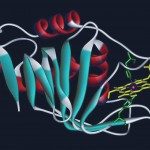Link to Pubmed [PMID] – 11955021
J. Mol. Biol. 2002 Apr;317(5):739-52
The temperature-dependence of a large number of NMR parameters describing hydrogen bond properties in the protein ubiquitin was followed over a range from 5 to 65 degrees C. The parameters comprise hydrogen bond (H-bond) scalar couplings, h3JNC’, chemical shifts, amide proton exchange rates, 15N relaxation parameters as well as covalent 1JNC’ and 1JNH couplings. A global weakening of the h3JNC’ coupling with increasing temperature is accompanied by a global upfield shift of the amide protons and a decrease of the sequential 1JNC’ couplings. If interpreted as a linear increase of the N…O distance, the change in h3JNC’ corresponds to an average linear thermal expansion coefficient for the NH–>O hydrogen bonds of 1.7 x 10(-4)/K, which is in good agreement with overall volume expansion coefficients observed for proteins. A residue-specific analysis reveals that not all hydrogen bonds are affected to the same extent by the thermal expansion. The end of beta-sheet beta1/beta5 at hydrogen bond E64–>Q2 appears as the most thermolabile, whereas the adjacent hydrogen bond I3–>L15 connecting beta-strands beta1 and beta2 is even stabilized slightly at higher temperatures. Additional evidence for the stabilization of the beta1/beta2 beta-hairpin at higher temperatures is found in reduced hydrogen exchange rates for strand end residue V17. This reduction corresponds to a stabilizing change in free energy of 9.7 kJ/mol for the beta1/beta2 hairpin. The result can be linked to the finding that the beta1/beta2 hairpin behaves as an autonomously folding unit in the A-state of ubiquitin under changed solvent conditions. For several amide groups the temperature-dependencies of the amide exchange rates and H-bond scalar couplings are uncorrelated. Therefore, amide exchange rates are not a sole function of the hydrogen bond “strength” as given by the electronic overlap of donors and acceptors, but are clearly dependent on other blocking mechanisms.

